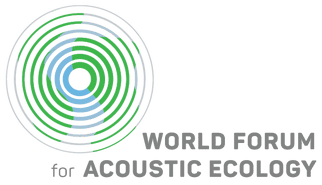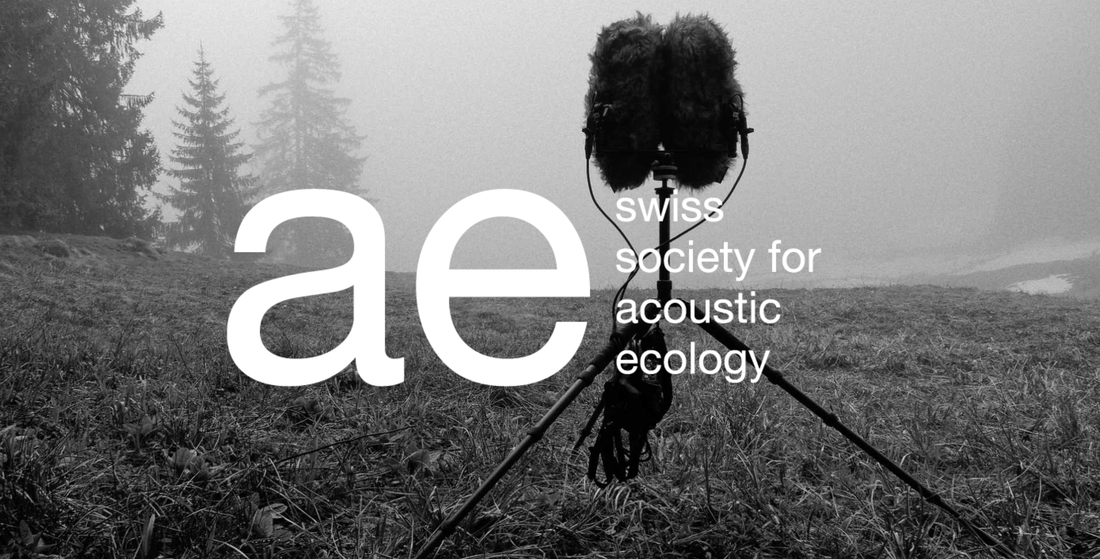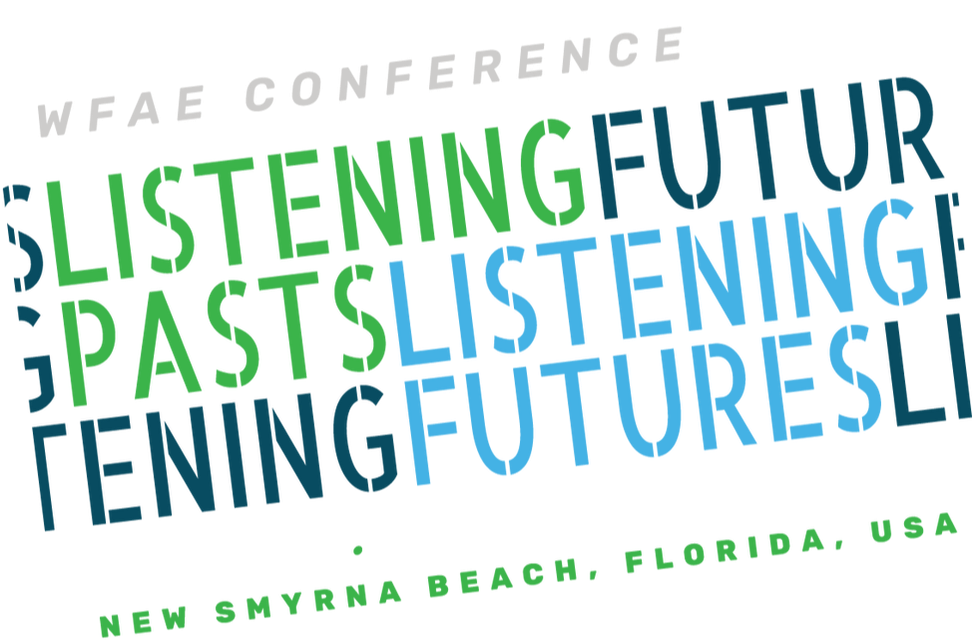|
Thursday, July 18 is World Listening Day!
Escuchar el tejido del tiempo/ Listening to the wave of time The 2024 World Listening Day theme was created by Chilean sound artists Valentina Villarroel Ambiado and Camila Cijka Arzola, who work as the art collective AOIR.
The World Listening Day website, recently redesigned by Alex Braidwood, reflects the organization's dynamic new branding, also created by Braidwood, and can be viewed in a number of languages.
New for 2024: "Listener Accounts" + Event Registration System If you wish to have your World Listening Day activation officially listed, first create a Listener profile. Once you have a profile, you can view other registrants and any social media links they have shared. Second, register, post, and promote your activities for World Listening Day 2024. An event will automatically appear on the public schedule when you register your "activation". It is not too late! Please create your listener account and register your event today. Students, amateurs, professional artists, and academics (maybe you are one or all of these!) are encouraged to participate in this free, global celebration of sound and listening. World Listening Day 2024 Global Schedule All registered events are automatically displayed on the World Listening Day site here. You do not need a listener account to see this public schedule. Thank You WFAE The World Listening Project extends its gratitude to the WFAE, its affiliate networks and individual members, who have participated in World Listening Day since its inception in 2010. Core ideas which have informed ways in which the World Listening Project now collaborates and its current direction were seeded at the World Forum for Acoustic Ecology's 30th Anniversary Conference in March, 2023 at the Atlantic Center for the Arts. Ideas on how we communicate and convene continued during a 3 day "World Listening Project" symposium sponsored by Iowa State University's Center for Excellence in Arts and the Humanities as part of its recognition of World Listening Project President and sound artist, Alex Braidwood, who is an Associate Professor of graphic design there. The World Listening Project's new, free program, Sessions on Listening, is a monthly, one-hour themed, but relatively open conversation held on Zoom. Curated by the board, and moderated by guests from around the globe. Please join us in August for the next episode and contact us if you would like to suggest a session and a time that works for you!
0 Comments
Eric Leonardson shares his reflections on the CENSE Cross European Network for Sonic Ecologies 2023 'Beyond Listening' Symposium held last year in Budapest, Hungary:
"The Beyond Listening symposium on art, agency, and the environment was a wonderful and moving opportunity to connect with well-known sound scholars, artists in Europe, South America and India..." Read more on the link below! En 2024, Pablo Sanz ha comisariado un programa de seminarios online en español y talleres presenciales para La Casa Encendida de Madrid.
In 2024, Pablo Sanz has curated an Spanish-language online seminar and in-person workshop program for La Casa Encendida in Madrid. El programa online cuenta con nueve sesiones con artistas e investigadores de Argentina, Costa Rica, México, Portugal y España: Gabriela De Mola y Belén Alfaro (Dobra Robota Editora), Eloisa Matheu, Susana Jiménez Carmona, Raquel Castro, Clara de Asís, Luz Maria . Sánchez, Marina Hervás, Carmen Pardo y Susan Campos Fonseca. The online program features nine sessions with artists and researchers from Argentina, Costa Rica, Mexico, Portugal and Spain: Gabriela De Mola & Belén Alfaro (Dobra Robota Editora), Eloisa Matheu, Susana Jiménez Carmona, Raquel Castro, Clara de Asís, Luz María Sanchez, Marina Hervás, Carmen Pardo, and Susan Campos Fonseca. El primer evento online, Hojas que suenan, con Gabriela De Mola y Belén Alfaro, se realizará el 21 de febrero de 2024 a las 17:00 horas. hora central europea. The first online event, Hojas que suenan, con Gabriela De Mola y Belén Alfaro, was held at 21 February 2024 at 17h CET. A three day event exploring the themes, issues and practices of contemporary field recording Dates: 4, 5, 6 July 2024 Venue: In person at London College of Communication, Elephant and Castle, London, SE1 6SB and online Following on from our previous call for contributions we are delighted to announce In The Field 2 an event exploring the themes, issues and practices of contemporary field recording. Over three days, through peer-reviewed presentations, workshops, sound and video works, we will share multi-disciplinary perspectives on practices, methods and theoretical approaches from over eighty international presenters.
Indicative panels are as follows (NB this is subject to change): Thursday 4 July Hearing Criticalities: Layers in Space and Time Capturing and Releasing Lifeworlds Placing the Field Memory Machines: Inclusion, Ethics, Authenticity Interference, Energy, Technology, Polyphony Friday 5 July (includes parallel sessions) Sonic Ethnographies and Subjectivities Acoustic Witnessing Audio Channels: Swarms, Streams, Samples, Dummy Heads The Social Lives of Sounds Sensory Collaborations Amplification, Attention, Reception Listening, Relistening, Reflecting, Resisting Performing Archives, Hearing Histories, Tuning Technologies Saturday 6 July Concrete and Abstract: Pressing Record and Activating Collections Localities and Elsewheres Bodies, Care and Ghosts There will also be a workshop programme and a listening room and video screening room available throughout the event. In the Field 2 follows on from the international 2013 symposium of the same name, organised by CRiSAP (Creative Research in Sound Arts Practice), University of the Arts London in collaboration with the British Library. While the 2013 event mapped contemporary practices and their historical precedents, In the Field 2 will investigate how the practice of field recording has changed in the intervening decade of escalating ecological, political, social and financial challenges.  From Barry Truax: Following four very successful previous versions of this course, I am offering to mentor another group of participants in a 12 week online course in sound and audio, starting Wednesday May 8 and going to July 31. There is no fee for participating in this group.We will be systematically going through the Tutorial associated with the Handbook for Acoustic Ecology located on the WSP Database, and covering two modules most weeks, one in acoustics, the other in electroacoustics. We’ll meet once a week on Zoom for 2-1/2 hours to discuss these topics, scheduled for 10:30 am – 1 pm PDT on Wednesdays. This course will be useful as professional development to those wanting to teach sound and audio, as well as graduate students and others who would like to broaden their knowledge across multiple disciplines. If anyone wants to take the course for academic credit, they need to set this up at their own institution and I would supervise it. The particular strengths (and challenges) of the Tutorial are the parallel modules in acoustics and electroacoustics that emphasize their often ignored links. I would expect participants to be more experienced in one or the other areas, but this course should allow for imbalances in knowledge to be addressed. The Tutorial and Handbook files can be downloaded by each individual for ease of access, but participants can also use the online version. The preferred browsers are Safari and Firefox (Catalina OS and Chrome also seem to work). Additional software for experimentation will be made available. Those interested who have the time (I estimate you will need a minimum of 6 hours a week for the webinar and individual study if you want to take it all in), apart from whatever time would be spent with the personal listening and studio experiments), please contact me at [email protected], if you have any questions or would like to view the Tutorial in advance, which I recommend. For those in the Pacific region and its time zones, this year for the first time, I have arranged a parallel version of the course, hosted by Jesse Budel from Australia who will present the same materials with my recorded audio and the same Tutorial material, starting Sunday May 12. As a freelance individual, he will need to charge a fee for this service. Those interested should contact him directly at: [email protected]  May/June 2024 - Brood XIII and XIX Cicadas’ Emergence In May/June 2024, American periodical cicadas — seven subspecies of Brood XIII and Brood XIX — will hatch simultaneously, a convergent phenomenon that occurs once every 221 years. The seven different species chorusing (each with a unique song) is an occasion to reflect on our interconnections with that which is other than human. The distribution of Brood XIX (17-year cicada) will range from central Illinois, around Springfield to east and further north as far as Chicago. Brood XIII (13-year cicada) will extend from Springfield into the southern portions of the state and westerly into the northeast. We ask potential contributors, participants, and the curious to provide us with the following information. Please include: 1. A brief idea about how you see yourself or your group interacting with the Broods, XIII, and/or XIX. 2. Your intent to cooperate and collaborate with CAEC on-site, or your design that is closer to home for local travel? Be specific knowing that flexibility is part of the process due to the timing when and exactly where the cicadas emerge from underground. Ask questions that you have about how you might want to contribute and participate. 3. Flexible time frame to work with weather and soil temperature that suits the cicadas. Some of us will be on location south of Springfield from May 27 – June 5. There will most likely be projects occurring before and after this time period, pre, and post-emergence. 4. An example(s) of past projects, interest in cicadas, and/or related experience. 5. Your takeaway or what results you would like to learn from the broods? What are the cicadas saying to you? 6. Your best contact information. 7. **Send your materials to Stephen Bradley ([[email protected]](mailto:[email protected])) and Matthew Wolkow ([[email protected]](mailto:[email protected]))** by or before May 7th, 2024. General inquiries are welcome. We will respond within a few days of your submission. *CAEC has emerged through the efforts of Matthew Wolkow (filmmaker), Stephen Bradley (experimental media sound artist-educator), and the Midwest Society of Acoustic Ecology (MSAE), Chicago. We seek to build to include arts community groups, cultural and community science groups, local historians, entomologists, ecologists, and curious participants. Matthew Wolkow will document and direct a feature film with Stephen Bradley, project coordinator, creating field recordings, and sound compositions.*  REVEIL is an annual collaborative sound and radio project that circles the Earth at daybreak, streaming live from a wide range of environments and situations over Dawn Chorus Day weekend. This year REVEIL embarks on its 11th loop around the sun. The broadcast is a collective production by streamers at listening points around the earth. Starting on the morning of Saturday 4 May in South London near the Greenwich Meridian, the broadcast will pick up feeds one by one, tracking the sunrise west from microphone to microphone, following the wave of intensified sound that loops the earth every 24 hours at first light. Streams come from a variety of locations and situations, at a time of day when many people are unaccustomed to be up and out, but sounds are vivid, especially in [northern hemisphere] Spring. The Reveil broadcast makes room by largely avoiding speech and music, gravitating to places where human and non human communities meet and soundworlds overlap. Tune into the streams on this link. The 'Acoustic Ecology Community Insights and Strategic Outlook - A Global Survey' report, prepared by Mickey Vallee, is now available. This report offers a strategic analysis of some of the current research projects conducted by practitioners who are members of or associated with the World Forum for Acoustic Ecology (WFAE), concentrating on the organization’s vision and the broader implications of sound ecology within local and global contexts. A thematic analysis identifies key themes within strategic visions and future goals, while demographic analysis will highlight the diversity of participant backgrounds, comparing these against thematic trends. Policy-related insights are provided to inform actionable recommendations for policy making, enhanced by an exploration of qualitative insights that consider pragmatic and philosophical perspectives.
This report organizes the findings into interrelated sections, informed by survey data, with the intention to act, in part, as a guide to the WFAE's strategic trajectory. The analytic process has ensured data integrity through cleaning and coding, while quantitative aspects were assessed using fundamental statistical measures. The survey's thematic analysis revealed key focus areas: community, environmentality, technology, interdisciplinarity, and inclusivity. The goal of this research has been to help guide the field toward a trajectory shaped by community engagement and public interest, enriched by a wide range of voices from around the world dedicated to acoustic ecology's study and application. Welcome to the January newsletter of the World Forum for Acoustic Ecology, featuring announcements of a new affiliate organisation, launch of Acoustic Ecology Review, 2023 CENSE conference wrapup and updates from various affiliates. Swiss Society for Acoustic Ecology, |
Archives
May 2024
Categories
All
|













 RSS Feed
RSS Feed